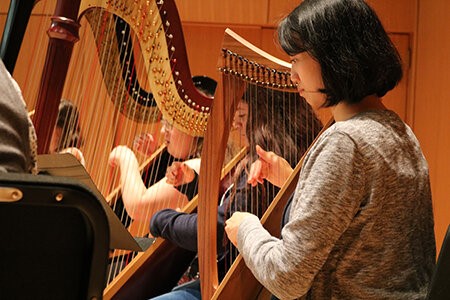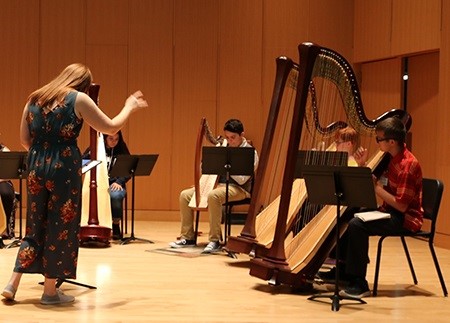Ancient Sound, Joyful Community
- Chen-Yu Huang, D.M.A.
- Assistant Professor
- College of Music
Project Overview
- Harp Day is an annual program that provides a community for harpists of all ages and abilities to learn, perform, and be inspired through a masterclass, workshops, guest presentations, a jam session, and final premier performance.
Products/Outcomes
- Premier performance of music commissioned especially for Harp Day
- Learning outcomes through the masterclass, workshops, and presentations
- A sense of community for harpists of all ages and abilities
Partners
- Molly O'Roark: Harp performer-composer-instructor, Urban Youth Harp Ensemble, Atlanta, Georgia; University of North Georgia at Dahlonega
- Local high school music teachers
- MSU Harp Studio students
Form(s) of Engagement
- Community-Engaged Creative Activity: Music and Performance
- Community-Engaged Teaching and Learning: Non-formal Educational Enrichment Programs for the Public

Professor Huang assists Harp Day participants during the Harp Jam rehearsal.
If music is a universal language, then perhaps it is needed now more than ever. Bringing people together to share joyful music and creative expression is one of the reasons Chen-Yu Huang loves to play—and teach others to play—the harp.
An assistant professor of harp in MSU's College of Music, Huang began playing harp at the age of 12, when her mother wanted her to audition for a talent class in her home country of Taiwan. The requirement was that each student auditioning must play the piano and one other instrument. Since her piano teacher also played harp, that's what Huang chose to play. She blossomed in her passion and skill, studying with several well-known harpists in Taiwan before coming to the U.S., where she pursued master's and doctoral degrees in harp performance at the University of Illinois at Urbana-Champaign.
Engagement is at the heart of everything Huang does, whether performing, teaching, or reaching out into the community. As a result, not only does she engage community; she creates community.
A Diverse Community; A Singular Focus
When Huang arrived at MSU's College of Music in 2014, she started the annual Harp Day, a full-day event (now spread over two days in hybrid format) that welcomes harpists of all ages and abilities to enjoy a masterclass, workshops, guest presentations, a harp jam, and a final recital.
Harp Day draws together all kinds of harpists, from both near and far, old and young, novice and expert, each expressing their own style and flair. And they must enjoy it, because approximately 85% of participants return each year. Huang believes the reason is that Harp Day provides a sense of community.
"Harpists are not like string players or wind or brass players. They don't often get to play in the orchestra in the school," she explained. "Even if they do, they are usually playing alone, and most of the time playing a violin part, instead of a real harp part. Having an event like Harp Day, you get to meet other harpists, listen to what other people are playing, jam together, and get motivated. It's a community."
A number of the participants at Harp Day each year are high school students.
Elijah Bates is a sophomore at Sturgis High School in Sturgis, Michigan. He has been playing harp for five years. This was his third year attending Harp Day. "I just love being around other harpists because we do have quite a few harp players at school, but outside of that, we don't meet other harpists that often," he said. "So, it's really cool to see everyone come together and hear harpists from all over. A lot of them are from Michigan, but some come from kind of far away, just to do Harp Day. It's really cool just to meet a community of harp players."
Bates believes that Harp Day inspires him and his classmates to become better harpists. "I believe it exposes us to other harp players who have been playing longer—there are even adults who attend Harp Day—so it's inspiring to see adult harpists who have played for many, many years, and that gives you something to aspire towards."
Even though playing harp might not become his full-time vocation, Bates knows that he will continue to enjoy playing the harp for years to come. "I love how unique of an instrument it is. But not only that, you don't see it very often," he said. "So when you play for people who have never even heard of a harp—or even those who have—it just sparks so much joy in them, and I love that!"
Jamming Together at Harp Day

Guest artist and composer Molly O'Roark works with a group of students from Sturgis High School during Harp Day.
A popular event at Harp Day is the harp jam, where participants come together to premier a piece commissioned just for the event.
"People always enjoy harp jam a lot, since you don't get to play with other harpists very often," said Huang. "Every year I would invite harpist-composer Molly O'Roark to write a piece for Harp Day, and the participants get to premier the piece on Harp Day!"
O'Roark is harp instructor at the Urban Youth Harp Ensemble in Atlanta, Georgia, and part-time harp faculty member at the University of North Georgia at Dahlonega. She first met Huang while still in high school when she attended the Illinois Summer Harp Classes, while Huang was in graduate school at the University of Illinois.
"She first reached out about commissioning a new work for Harp Day back in 2017," said O'Roark. "And since then, it has become an annual thing, except in 2020, and I have really enjoyed it!"
O'Roark explains that her compositions are often inspired by stories or scientific concepts—or just anything she finds fascinating or unusual. This year's piece, Aurora Borealis, was inspired by the natural phenomenon. "I really want to see the northern lights one day and am a big sci-fi fan and wanted to write a piece inspired by the dancing lights across the sky," she said.
Once O'Roark has decided on a topic, she begins to improvise until something she likes emerges. "It might start as a small fragment of melody or a cool rhythmic pattern," she explained. "Sometimes I will have an overall plan of the structure of what I want to do, but it really depends on the piece. I typically write all of it while sitting behind my harp so that I can really imagine the sounds rather than just relying on my computer to recreate it. Most of the time, I can't really hear it all together until it gets to the premiere, which is why I always love writing for Harp Day!"
Sharing the Joy Through Teaching
Huang truly gets the greatest joy from sharing harp music with others, especially through teaching and inspiring not only her own students, but students from all walks of life and all levels of ability. "I do love teaching harp a lot," she said. "I love discussing musical challenges with my students, and I feel like I become a better student myself as I teach. So, I also encourage students to teach, too!"
Belle Coty is one of Huang's students, pursuing a master's degree in harp performance. She first met Huang while attending Harp Day as a high school student.
"Chen-Yu is an amazing teacher and she's been such a great person to have a connection with," said Coty. "She knows all sorts of harpists and brings them in to do lots of workshops. And you don't just learn about the classical genre of harp. She makes it a really well-rounded education."
As a student in MSU's College of Music, Coty has participated in outreach to elementary schools and senior living centers, sharing the love of music-making with the local community. She and other harp students also have the opportunity to both help with and participate in Harp Day. "As students, we go and help set up and show everybody where to go, and we're there to answer any questions," said Coty. "But we also participate in the final performance that happens at the end. So just kind of fill in the gaps. Chen-Yu has done a lot for outreach for harp and Harp Day grows every single year."
An Ancient Instrument
Even though the harp is one of the oldest instruments in the world, many people don't know a lot about it, so Huang fills in some of the details:
"In many archeology sites and artworks, you can see some forms of harps," she said. "It comes in different shapes and sizes since it was developed in different parts of the world. Places in Africa, Mexico, Paraguay, and Ireland still keep their folk harps as they were in the ancient time."
She explained that the concert grand harp that is used in the concert hall today was not developed until 1810 A.D., largely in response to the chromaticism that was profuse in Western classical music in the 19th century. Developing such a harp was a tremendous challenge.
"Many people don't know this, but to accommodate the chromaticism, a concert grand harp has seven pedals to control seven pitches (A,B,C,D,E,F,G) and make it sharp, natural, or flat," explained Huang. "So, a harpist's challenges are not only mastering their fingers on the strings, but also managing seven pedals with two feet!"
It's a difficult skill to acquire, for sure, but one she loves to share with others.
"Learning music really takes your body, mind, and soul, and it reflects who you are as a human," said Huang. "I truly believe being a music teacher in some way is being a mentor of someone, and I think all the faculty at College of Music would agree with me."
Huang is the principal harpist for the Jackson Symphony and Ann Arbor Symphony, as well as with the Formosa Trio and Accorda Trio. She has won numerous awards and competitions, including several for which she is the first harpist ever to be awarded. Huang and the Formosa Trio have released a chamber album, First Impression, available at her website, as well as Spotify and Amazon.
- Written by Amy Byle, University Outreach and Engagement
- Photographs courtesy of the College of Music Harp Studio